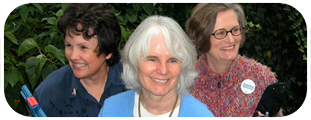Recently in Big Picture - Natural World Category
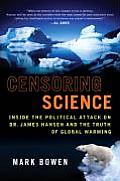 "Once those blinders are off, it's pretty near impossible to put them back on", my friend Sally Giovine-Kerr used to say when someone of her many, many friends or acquaintances had one of those "aha" moments about the role of women, or the Vietnam War, or race issues. Sally of course was one of those people who helped pull those blinders away, sometimes gently, other times rather painfully. She asked questions and then she listened to the answers and often commented and took what she heard back to what we call politics. She brought up issues others wouldn't. If she'd been of the right age now, she might well have been a rather outrageous blogger.
"Once those blinders are off, it's pretty near impossible to put them back on", my friend Sally Giovine-Kerr used to say when someone of her many, many friends or acquaintances had one of those "aha" moments about the role of women, or the Vietnam War, or race issues. Sally of course was one of those people who helped pull those blinders away, sometimes gently, other times rather painfully. She asked questions and then she listened to the answers and often commented and took what she heard back to what we call politics. She brought up issues others wouldn't. If she'd been of the right age now, she might well have been a rather outrageous blogger. Sally asked very personal questions of people and they would more often than not reach into themselves to give her an answer that carried a truth that surprised that person as well. She connected dots for people, in the language we use today, dots between the personal and the political. The thing was, Sally really cared about the answers she got from people. She wanted to know how a couple resolved differences or how it was to be the first woman working as an able bodied seaman in the Washington State Ferry System or to be an 11-year old whose parents were fighting. Sally wanted to hear their answers. She also had astounding stories. She talked too about things I was not accustomed to hearing out of the mouths of any adults I knew - like about how it had been to be a thinking, political person in the fifties during the McCarthy Era. She and her first husband, who hung out with the cool Democratic couples in Olympia, were able only to talk with one couple in Oregon, of the many dozens of people they counted as friends, about national politics, about the HUAC Committee and the many people who were losing their jobs for the wrong reasons. For me it sounded awful but that time was ancient history and was not going to be repeated. I came of age in the sixties when it looked for some period of time like we'd really changed the world. We'd learned from the McCarthy era. We had a stronger press and wouldn't allow anything like that to happen again.

Ha! I've thought about those remembered conversations and my dismissals many times in the last few years, forty years after a time here in America when people were so scared that many could not talk honestly to even their friends about the craziness that was going on in our capital. And far more people simply didn't pay attention to it.
I just finished reading a deeply distressing book, "Censoring Science: Inside the Political Attack on Dr. James Hansen and the TRUTH of Global Warming" a new book by Mark Bowen that ripped off my blinders a couple different ways. The story covered two different issues - rather awkwardly actually - but each topic was covered so well that I forgave the author for that lack of smoothness. The first story is about the spreading censorship of scientists in the Bush/Cheney years, brilliant researchers and professors who worked on any aspect of climate change, whether it be oceanographers at NOAA or regulators at the EPA or the researchers at NASA who were now being prevented from talking directly about their research to the public or drawing the obvious implications about policy going forward. Dr. James Hansen, NASA's leading climate expert, the primary example, was being harassed about providing a standard set of facts about the average temperature of the earth's atmosphere that had been provided to the press for thirty years. This was 2005, the year that broke all previous records and threatened to make people take climate change seriously. All of a sudden in the Bush/Cheney years it was "too policy-oriented" and there were public affairs "minders" at each agency that made it difficult for scientists, some very well-known, to get the message about global warming and climate change out clearly to the public and the policy-makers.
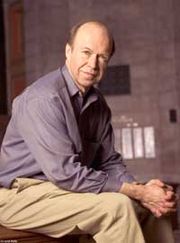 The second is the actual set of observations and recommendations that the well-known Dr. James Hansen was writing and talking about anyway. Hansen is the man who has been accurately talking about the big picture of climate change for over 30 years and whose predictions have been chillingly accurate. It was Hansen's difficulties in getting his message out that inspired this book, which then widened to include scientists from other related agencies that might also be stepping the on the toes of the old energy corporations. It was a widespread phenomena during the Bush years, that only got worse and worse until huge amounts of the budgets for basic Earth Sciences programs, data acquiring programs that obtain the raw temperature data from satellites around the earth were begin systematically shut down for lack of funds. Of course there were few fingerprints on the censorship activities that led back to a common administration source or policy. Reagan and Bush Sr. had done some of the same but the Bush/Cheney administration made it frighteningly systematic.
The second is the actual set of observations and recommendations that the well-known Dr. James Hansen was writing and talking about anyway. Hansen is the man who has been accurately talking about the big picture of climate change for over 30 years and whose predictions have been chillingly accurate. It was Hansen's difficulties in getting his message out that inspired this book, which then widened to include scientists from other related agencies that might also be stepping the on the toes of the old energy corporations. It was a widespread phenomena during the Bush years, that only got worse and worse until huge amounts of the budgets for basic Earth Sciences programs, data acquiring programs that obtain the raw temperature data from satellites around the earth were begin systematically shut down for lack of funds. Of course there were few fingerprints on the censorship activities that led back to a common administration source or policy. Reagan and Bush Sr. had done some of the same but the Bush/Cheney administration made it frighteningly systematic.The book is well worth reading. The future of the planet may well depend on understanding how to prevent this censoring of science from ever occurring again.
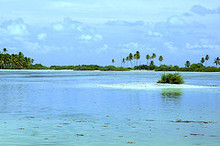 Yesterday, along with President Obama and Colonel Quaddafi, the President of the Maldives, Mohammed Nasheed, addressed the UN General Assembly. Nasheed spoke only for a few minutes but what he said may have been the most important words spoken all day.
Yesterday, along with President Obama and Colonel Quaddafi, the President of the Maldives, Mohammed Nasheed, addressed the UN General Assembly. Nasheed spoke only for a few minutes but what he said may have been the most important words spoken all day.The Maldives are one of the nations most impacted by global warming. They will disappear under the Indian Ocean if the sea level rises more than a meter. The nation is actually raising money to move the entire population somewhere else. They are the proverbial canary. So, President Nasheed called on the members of the UN to make the upcoming climate summit in Copenhagen a success. He called for a return of CO2 levels in the atmosphere to 350 parts per million, the level that our best scientists say is what is needed to stabilize the world's climate.
Here are his first few words:
Here in the Maldives, it's easy to see why the math of the current climate change debate just doesn't add up -- and why negotiators are going to have to work a lot harder before the Copenhagen climate conference if they're interested in the survival of much of the planet. The Maldives stretches 800 kilometers across the Indian Ocean, an archipelago of 1,200 tropical islands just a few meters above sea level. It is incomparably beautiful but also highly vulnerable. Sea level rise of even half a meter would make much of it uninhabitable; meanwhile, ocean temperature spikes could destroy the coral reefs that protect these islands from the waves.And his closing challenge to the world leaders:
This is why no one in the Maldives is applauding the recent pledge of the G-8 nations to try and hold temperature increases to 2 degrees and the atmospheric concentration of CO2 to 450 parts per million. A few years ago, those might have been laudable goals, but new science makes clear they're out of date.
The climate is near a tipping point -- when the Arctic suddenly melts and the glaciers disappear, that's a very bad sign. We need our political system to cross a tipping point, too, to move from feel-good statements to actual solutions, cutting emissions quickly enough to meet the demands of science. But politicians are reluctant to act unless the people act first. The events in New York and on October 24th provide ordinary people with the opportunity to make their voices heard and, in doing so, remind politicians who is ultimately in charge.And here is the transcript and a YouTube of what he said.
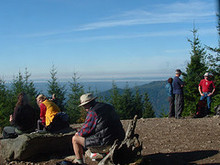 Late yesterday a federal court judge in Seattle halted the expansion of a gravel mine on Maury Island and ordered federal studies to consider the consequences of the expansion on salmon and orcas. Yeah! Environmentalists had sued the U.S. Army Corps of Engineers over its lack of consultation with federal fisheries biologists on the project's impact to our endangered species.
Late yesterday a federal court judge in Seattle halted the expansion of a gravel mine on Maury Island and ordered federal studies to consider the consequences of the expansion on salmon and orcas. Yeah! Environmentalists had sued the U.S. Army Corps of Engineers over its lack of consultation with federal fisheries biologists on the project's impact to our endangered species. This is a huge win for the environmentalists and local inhabitants who had been working for years to prevent the expansion. According to the AP, "The judge said the federal agencies didn't take the requisite "hard look" at the environmental consequences of the proposed project. He ordered a halt to construction of the dock until those federal studies were completed." State Lands Commissioner Peter Goldmark then issued a statement yesterday saying the company's lease was no longer in compliance with the terms of the lease. Goldmark has asked the company who owns the gravel pit, Glacier Northwest, to halt operation until it shows that it is complying with those terms.
The terms of the discussion are clearly changing. And having a Democratic Lands Commissioner makes a big difference as well.
We can individually and collectively figure out this change-your-culture/economy/planet-on-a-dime thing we are being asked to do. I saw something today that took every doubt from my mind but that we are going to be able to do this. This is a story about a toilet, a new toilet built to recycle our poo. Or, if we can't get that part of the culture changed enough here, due to our slowness in changing our basic bathroom habits, it's something for the 40% of the world's population that doesn't currently use a toilet. (Yep, that statistic took me back too.) This toilet is called the LooWatt. Here's Virginia Gardiner from a company called Dwell. Watch:
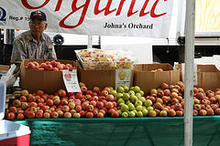 My day job at the Institute for Washington's Future (IWF) includes writing about issues such as Climate Change, Agriculture and Food Policy, and Alternative Energy. There is an underlying focus on revitalizing our rural economies, understanding the impact of the large Latino population in our rural areas, and discussing how we might prevent nasty climate dislocations. I talk about state and national policies and issues and how they impact what we are doing in these areas.
My day job at the Institute for Washington's Future (IWF) includes writing about issues such as Climate Change, Agriculture and Food Policy, and Alternative Energy. There is an underlying focus on revitalizing our rural economies, understanding the impact of the large Latino population in our rural areas, and discussing how we might prevent nasty climate dislocations. I talk about state and national policies and issues and how they impact what we are doing in these areas. It can be a scary job sometimes. I learn more about how little room for continuing to pour greenhouse gases into the atmosphere we have than I would like to know. I learn about the incredible differences between food that is grown organically and that which is produced by industrial farming methods. The good news is that I also learn about how much people are doing to shift to green building methods and renewable fuels and sustainable farming. I will occasionally send you over to that site rather than reproduce the pieces here.
Here are three recent posts:
The Low-Down on the Climate Bill
This is the basics of last Friday's climate bill that was passed in the House and that will now go to the Senate. It's possible although unlikely that it will be improved either in the Senate or in the subsequent conference, which is too bad because this bill was way watered down from what Obama originally asked for in order to get the 219-212 passage.
Why it Matters that WA Has No Congressfolk on the Ag Committees
I noticed a while ago that none of our U.S. Senators or Representatives from Washington State are on any of the Agricultural. Committees. I've been told that both Senators Murray and Cantwell make sure that Washington's interests are taken into account for specific projects. It's not enough. Not having a consistent voice for the unique agricultural landscape we have here has implications.
Making Woody Biomass Work
Wouldn't it be great if the stimulus money really worked on all cylinders for us? The harvesting and utilization of woody biomass, the forest waste products that contribute to forest fires when left laying about, is an example of how to provide jobs, help prevent forest fires, allow for more rural business growth and provide a source of renewable energy for rural schools, prisons and homes.
